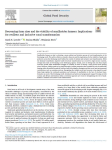Lowder S.K., Bhalla G., Davis B. (2025). Decreasing farm sizes and the viability of smallholder farmers: implications for resilient and inclusive rural transformation. Global Food Security, 01/06/2025, vol. 45, p. 100854.
https://doi.org/10.1016/j.gfs.2025.100854
https://doi.org/10.1016/j.gfs.2025.100854
| Titre : | Decreasing farm sizes and the viability of smallholder farmers: implications for resilient and inclusive rural transformation (2025) |
| Auteurs : | S.K. Lowder ; G. Bhalla ; B. Davis |
| Type de document : | Article |
| Dans : | Global Food Security (vol. 45, June 2025) |
| Article en page(s) : | p. 100854 |
| Langues : | Anglais |
| Langues du résumé : | Anglais |
| Catégories : |
Catégories principales 06 - AGRICULTURE. FORÊTS. PÊCHES ; 6.5 - Gestion des ExploitationsThésaurus IAMM PETITE EXPLOITATION AGRICOLE ; TAILLE DE L'EXPLOITATION AGRICOLE ; STRUCTURE AGRICOLE ; DEVELOPPEMENT RURAL ; PAYS EN DEVELOPPEMENT |
| Résumé : | Smallholder farmers are key to achieving a more resilient and inclusive process of rural transformation in the developing world. This article reflects on trends in farm size and the implications for the viability of small-scale producers across the developing world within the context of resilient and inclusive rural transformation. While the farmland consolidation expected under structural transformation has occurred in high income countries, average farm sizes are decreasing across developing regions. Clearly, more is driving farm size than simply economic growth. Most smallholders struggle for viability in terms of earning a living income from farming alone. However, viability needs to be viewed through a broader perspective that considers the role of smallholder farming within diversified household livelihood and risk mitigation strategies and their social and environmental contributions, such as ecosystem services. Recognizing the multiple social and economic roles played by small farms helps explain the continued persistence and relevance of smallholders in the face of structural transformation in much of the developing world. Investment and policy and programmatic support focusing on both on-farm and off-farm interventions within a territorial approach are crucial to strengthening the role of smallholders in resilient and inclusive rural transformation. |
| Cote : | En ligne |
| URL / DOI : | https://doi.org/10.1016/j.gfs.2025.100854 |







